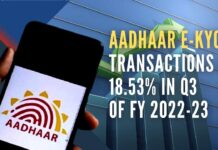
PSBs trigger twin balance-sheet fiascoes: imprudently decided projects going down, taking the lending banks with them
The shortest distance between two points is a straight line. Elementary, isn’t it? But what if somebody wanted to prove otherwise? It will be a futile exercise. But that doesn’t bother our political masters. So, now the government set up a ‘bad bank,’ evidently to end all bad banks.
The government has constituted a committee of bankers to examine various mechanisms to tackle the problem of non-performing assets (NPAs) of public sector banks (PSBs). Top on the agenda is the idea of a bad bank. Finance Minister Piyush Goyal on Friday announced such a panel. Headed by Punjab National Bank chairman Sunil Mehta, it would explore the possibility of creating a new asset reconstruction company (ARC) or asset management company (AMC) to subsume the bad loans of PSBs.
If all or most NPAs could be dumped into a ‘bad bank,’ PSBs could get back to business—that is, they would be able to lend more. Owing to high NPAs, the Reserve Bank of India had recently disallowed the state-run Dena Bank to issue loans. If you move the stressed assets to a specialized entity, then you can allow banks to focus on regular business, Bloomberg quoted State Bank of India chairman Rajnish Kumar as saying.
PSBs are doing just that in the economic arena. The taxpayer has to pay for their sins (actually the misdemeanors of politicians and their cronies in business, done through state-run banks).
The government seems to be in a committee-forming spree. Addressing the media after a meeting with a group of bank chiefs, the Finance Minister announced the setting up of that another group of bankers under Bank of Baroda managing director P.S. Jayakumar. It will chalk out a roadmap for a consortium of PSBs to take over good loans the RBI’s prompt corrective action (PCA).
So many committees, meetings, activity, promises, speeches, abbreviations. And it’s not the first time; there have been committees, meetings, activity, promises, speeches, abbreviations in the past. In fact, several times under all government. NPAs of government-owned banks jumped from 5.43 per cent (Rs 278,466 crore) in March 2015 to 13.69 per cent (Rs 733,137 crore) June 2017 to 11.2 percent (Rs 103,000 crore) in March 2018.
Everybody knows what the straight line is—privatization of PSBs in this context. But everybody wants to deny this fact and refuse to see the writing on the wall. Or, for that matter, the writings of experts. The Narasimhan and Nayak Committees of the RBI, in 1998 and 2014 respectively, had suggested privatization of state-owned banks. Chief Economic Adviser Arvind Subramanian also believes that selling PSBs would be a good idea.
But then public sector entities are holy cows, and we are Hindus; we don’t slaughter cows, holy or otherwise. We let them loiter on roads and streets; swarm garbage heaps, and dirty the surroundings.
PSBs are doing just that in the economic arena. The taxpayer has to pay for their sins (actually the misdemeanours of politicians and their cronies in business, done through state-run banks). He ends up paying very high prices for petroleum products; the soldier has to risk his life because of poor-quality helmets and bullet-proof jackets.
Further, PSBs trigger twin balance-sheet fiascoes: imprudently decided (and often politically-linked) projects going down, taking the lending banks with them. Both the company running the project and the banker gets hurt. This not only strains the public exchequer and raises NPAs but also curbs further lending, thus adversely impacting the economy.
All politicians are undeterred by these facts. They continue to work on PSB restructuring without privatization. But reviving ailing PSBs—and practically all of them suffer from various degrees of sickness—without privatizing them is such a logical impossibility. But then in India, politics is the art of the impossible. Often, it is, to use Will Durant’s words, the longest distance between two points that is the straight line.
Note:
1. The views expressed here are those of the author and do not necessarily represent or reflect the views of PGurus.
- Liberty Is Penalized, Violence Goes Untouched - December 21, 2019
- Rahul’s Howdy bloomer - September 22, 2019
- Chidambaram’s hypocrisy - August 22, 2019











Committee should be headed by a person having financial expertise but he should not be part of any of the PSBs. Then only a true and soul searching exercise can be carried out, to find out what, where and when the PSBs went wrong and the remedy for it. Such a Committee be either headed by Shri S Gurumurthy OR Prof R Vaidyanathan, who are NOT part of the PSBs. Then only a worthwhile and productive exercise can be made. Otherwise it is like COMMITTEE MEETS TO ADJOURN and ADJOURNS TO MEET AGAIN. As for General Public whose money is with many PSBs ” NAMAKKU MOONRU NAAMAME “